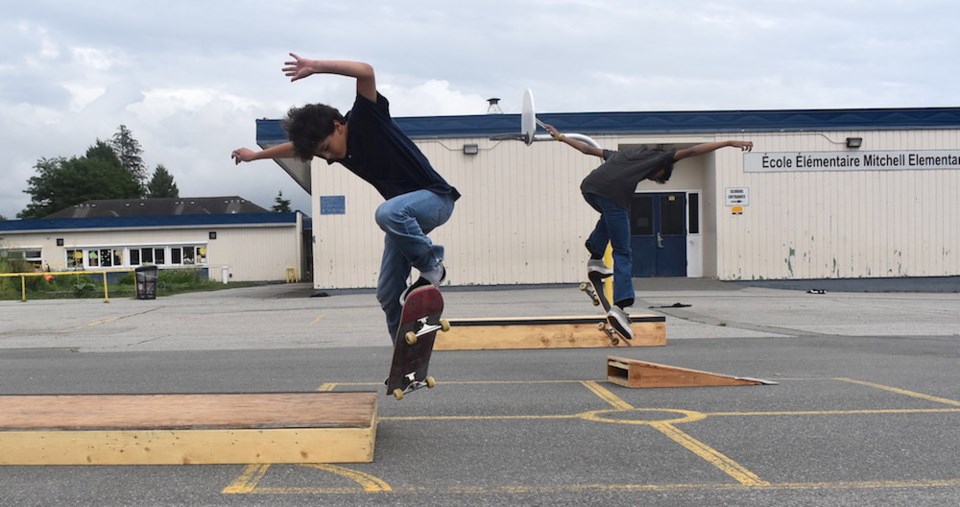Students at Mitchell Elementary really wish there was a skatepark in east Richmond.
But at the moment, they have a makeshift one – with ramps and obstacles that they built with their teacher – and they meet in the parking lot of their school three times a week.
Earlier this year, Zaki Merbah and Tobey Soliven, both in Grade 7 at Mitchell elementary, wrote essays advocating for a skatepark close to where they live.
Their teacher at that time, Joel Field, was so impressed with their arguments, he decided to step up and create a skate club at the school.
Field hadn’t been on a board much himself since his early twenties.
Tobey said skateboarding is a “great pastime to get my mind off things.”
Some of the tricks he’s mastered so far are ollies, front shove-its and kickflips – the last one it took a “solid year” to learn, but in the end, his determination saw him through.
“(It required) technique and, for myself, commitment because I couldn’t get the courage to commit,” Tobey said.
Tobey said he still wants to learn treflips, heelflips and back-threes.
Having the skateboard club at Mitchell elementary saves him the long drive to ready-built facilities in west Richmond.
“I really appreciate how we got to build our own obstacles, so we don’t have to go the skatepark all the time,” Tobey said.
Skateboarders often ride on the road and see stair sets, ledges and ramps as challenges to overcome.
Not having a skateboard facility in east Richmond causes the “classic skateboard problem,” Field said.
“Everywhere you go you get in trouble,” he added.
This is echoed by Zaki, the other student who wrote about skateboarding.
“You get kicked out (of many places) which is why we need a skatepark,” he said.
In addition to building their own obstacles, the club got help from a skateshop in Vancouver, Anti-Social, which donated six fully equipped boards and gave them eight helmets at cost.
Skateboarding isn’t an easy sport and every little thing that the kids learn is a victory, Field said.
“If you can find proficiency in skateboarding, you can find proficiency in almost anything,” he added.
Field started skateboarding in Grade 8 and continued until his early twenties.
Inspired by his students, he has picked up a board again, now in his late thirties.
Learning to skateboard is a long process and it involves a lot of falling and getting back up.
“Every time you find a new trick, it’s like levelling up,” Field said.
Skateboarding, however, is more than just a sport – it’s a sense of identity, belonging and community, he added.



